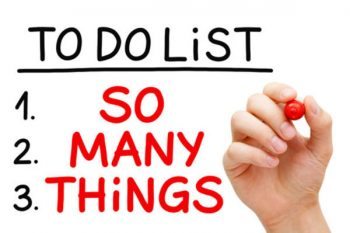
Take note: It’s not how much we do; it’s how we do it.
Do, do do! Go, go, go! Do you ever feel overwhelmed by how much you have to do? Do you get anxious thinking of your never-ending to-do list? Do you feel overworked like you’re operating in a frenzied flurry with things pulling you in several directions at once?
With so much technology that’s supposed to help make our lives easier, why are so many people on the brink of a burn-out? It’s simple; we take on too much because we are taught to. We are led to believe that the busier we are, the more important we are. We live in a society that encourages us to keep moving at rapid speed to prevent missing any opportunities.
What are the consequences of taking on too much? In addition to the negative effects on our mental and physical wellbeing, in a race to accomplish the most, we risk not accomplishing things successfully. Feeling the pressure of all that needs to get done, we lose direction and focus until eventually we crash and burn.

Photo Credit: www.sott.net
So how do we stop taking on so much? How do we stay focused on one task in a world that pulls us in so many different directions? The first step is being open to the idea that we can actually accomplish more by doing less. Not sure how to process this idea or what steps you can take to put it in action?
Read our top tips on how to get started.
Learn your limits. Be realistic with your to-do list. Understand that we are in control of our lives; it may not feel that way at times, especially when the list of responsibilities includes taking care of others (for example parenting), but we are. We have to acknowledge when we are setting ourselves up for failure by taking on too much. The key is to be proactive; remove the ego mentality that makes you think your worth is linked to how many things you get done and ask for help. Feeling overworked leads to stress which makes it difficult to live with a positive, healthy mind and/or body. We need to learn to listen to ourselves; our intuition knows when we are taking on too much and we need to stop ignoring it. If we set limits on how much we can handle, we can beat a burn-out before it begins.
Know when to say no. After you acknowledge your limits, master the art of saying no; it doesn’t have to be negative. Communicate with positivity when you decline taking on another task or negotiating a deadline (do this in advance or mid-way through to ensure it’s a timeframe that works for everyone) and you may be pleasantly surprised at how well it’s received by others. People will appreciate your honesty; it’s much better to say no from the start then commit to something you will be late with, complete at low quality or not get done on at all. If you have a hard time saying no because you want to help people, remember that if you burn out you won’t be able to help anyone.

Photo Credit: www.keyword-suggestions.com
Stop multi-tasking. Why? It doesn’t work. In its original, full definition, multi-tasking refers to concurrent tasks done by a computer. It’s a method of programming designed for technology, not humans. Despite that, it’s a strategy far too many employ to cope with their heavy to-do lists. What are the consequences? We do things simultaneously or haphazardly ignoring the reality that this leaves a higher margin for error which can have serious consequences. Case and point; driving and texting. A habit so dangerous it’s illegal in many countries including India, the United Kingdom and Canada. The United States of America has banned it in most states due to it causing 1.6 million car crashes a year. Drivers are 23 times more likely to get in a car accident if texting while driving but many admit to still doing it. Hundreds of research studies demonstrate that multi-tasking is a cause for concern. We can increase our productivity and simplify our lives by not doing so much simultaneously.
Learn how your brain works. With the brain’s ability to store about 5 to 9 things at once, we lose a lot of information when we’re in a hurry. When we don’t allow our brains to process, we decrease the likelihood for the information moving from our short-term to long-term memory. This can lead to a loss of time if we misunderstand or need to go back to remember things. The better we understand the science behind our brains, the more we can optimize them.

Photo Credit: www.appspsychology.com
Focus on quality over quantity. It’s better to do one thing exceptionally well then three things haphazardly. We have to shift our views on success and go back to a simpler mentality that focuses on quality over quantity. Focused attention leads to better results. Author, CEO, speaker and co-founder of Google’s Search Inside Yourself program Mark Lesser is a thought leader and advocate on the art of simplifying life to increase productivity.
Main Image Photo Creditt: www.healthylifeharbinger.com
Original Post Date: October 17, 2016
Rachna Sethi
Author
Rachna (@thesassyspiritual) is a graduate of the Applied Mindfulness Meditation program from the University of Toronto, a certified Educator with two bachelor degrees and a diploma in Art Therapy. She's dedicated to living with a compassionate approach. Committed to helping people integrate Mindfuln...
COMMENTS
YOU MAY ALSO LIKE
Newsletter Sign Up
Subscribe to our FREE newsletter for all of the latest news, articles, and videos delivered directly to your inbox each day!














































































































